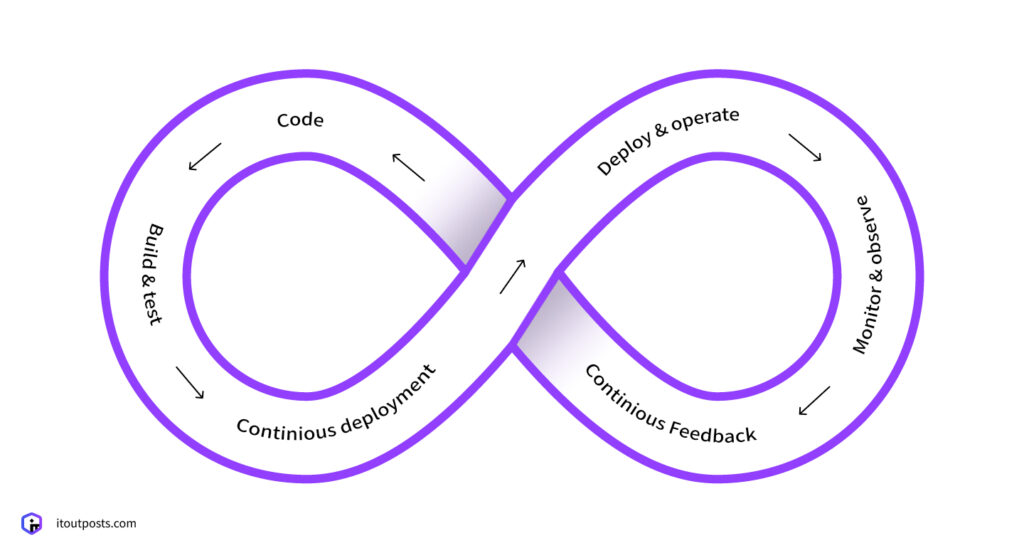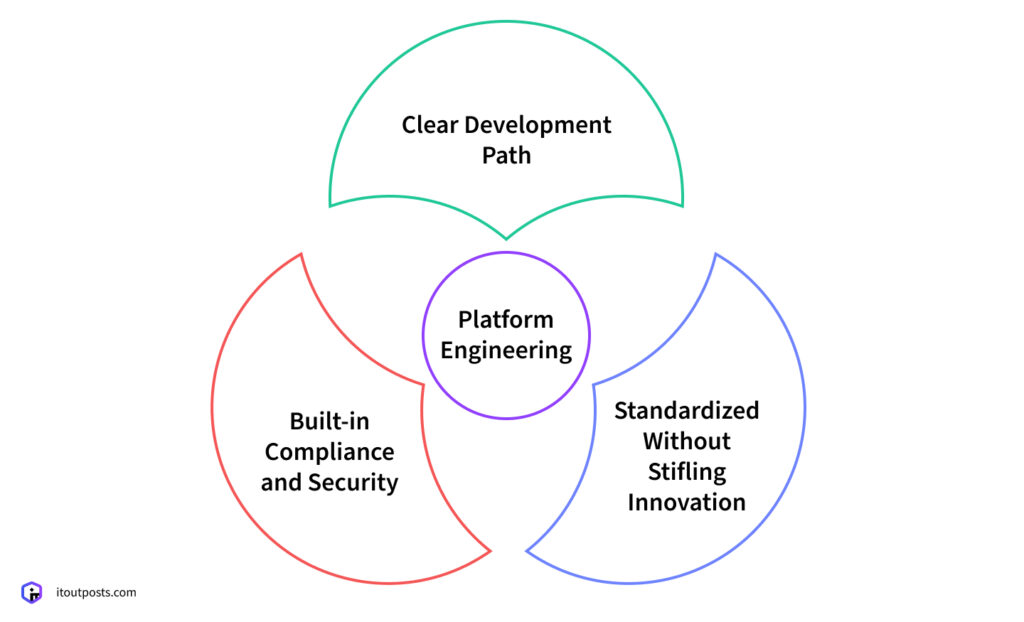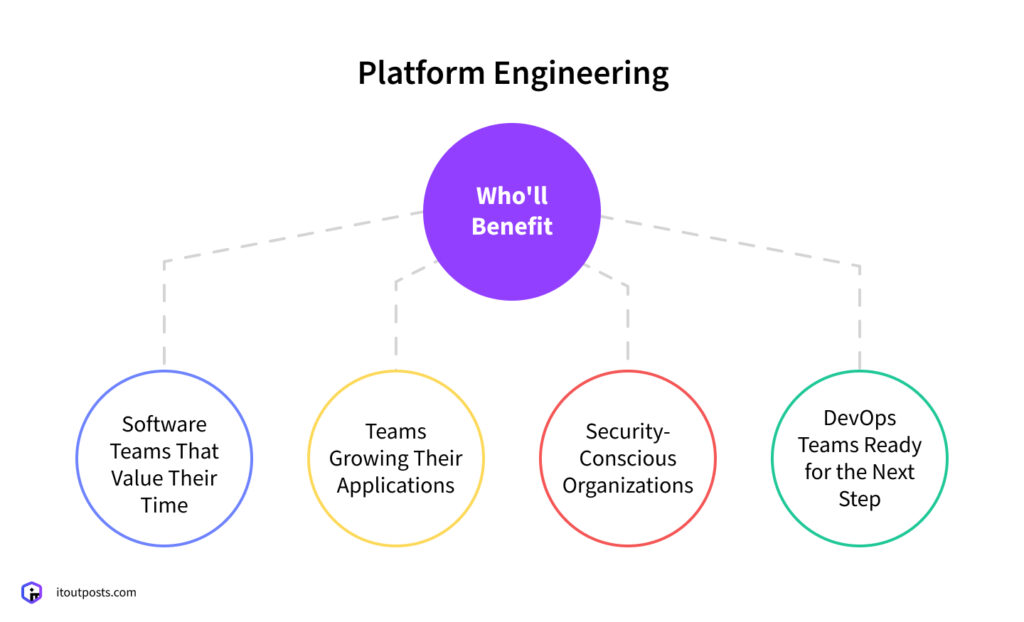Contents
Every company can build and ship software today. But the question is, can every setup tackle the challenges of tomorrow?
The truth is, some teams can be so busy chasing quick wins that they often forget to plan for the future. As a result, they get stuck with rigid systems that can’t keep up as the business expands. Not to mention scripts that accumulate, so that the only way to make even the tiniest improvement is to ruin the entire system. What happens next is the massive rewrite that drains budgets and takes a lifetime.
Platform engineering offers a better way. It allows you to build a single “developer platform” that can be used across your entire organization and easily adjusted as your business grows. In this article, we’ll explore why platform engineering is becoming a must-have for modern software development.
What Is Platform Engineering?
Platform engineering is an approach to software development and delivery that implies building and maintaining a reusable internal developer platform that makes it easier for teams to develop, test, and deploy software in a consistent way across an organization. It brings together tools, workflows, and infrastructure into a unified system.
In other words, platform engineering is about creating a self-service developer experience. Developers get access to pre-configured tools and automated processes and, thus, don’t have to build deployment pipelines and set up monitoring each time it’s needed. This not only helps teams work more quickly but also ensures they follow security and operational best practices.
How Does Platform Engineering Differ from DevOps?
DevOps provides a solid set of practices that help us deliver software faster and more reliably. It shows us how to automate deployments, integrate our development continuously, monitor systems, and encourage teamwork.

Platform engineering isn’t here to replace DevOps; it’s meant to build on it. It takes the tried-and-true DevOps principles and turns them into internal products that simplify the process for all teams. This way, organizations can implement DevOps across the board while cutting down on repetitive tasks and keeping high standards throughout.
What Are the Benefits of Platform Engineering?
In fact, over half of the organizations surveyed are already using platform engineering. Whether your team has already implemented DevOps practices or is just beginning its automation journey, you might be curious about what platform engineering brings to the table. Here’s why it’s a game changer, even for teams that already have a DevOps foundation.
Clear Development Path
The platform lays out straightforward, documented ways to get common tasks done. Everyone knows how to deploy code, where to check logs, and what steps to take when issues pop up since these workflows are infused into the platform. This cuts down on confusion and arguments over the “right way” to do things, making development and deployment more consistent.
Built-in Compliance and Security
If you’re tired of worrying about whether your systems comply with GDPR, HIPAA, ISO 27001, SOC 2, and other regulations, a well-crafted platform will take care of this for you. Thus, you won’t have to check if every deployment meets regulations since your platform integrates these requirements into every workflow. Each time you deploy code or launch a new service, your pre-configured platform will automatically apply the necessary security measures and compliance checks.
Standardized Without Stifling Innovation
Have you ever found yourself torn between giving your teams the freedom to be creative and keeping your services secure and manageable? Platform engineering aims to solve this dilemma. By pairing clearly defined development paths with built-in compliance, you receive true innovation freedom.
When your developers initiate a new project, they receive “golden path” templates that already come with all the security and compliance measures. Eventually, you won’t have to wonder if something’s secure or compliant since if it’s in the platform, it’s good to go.

Who Is Platform Engineering Perfect For?
If you think platform engineering is just for the big tech companies with huge teams, different organizations can actually benefit from this solution. Here are some of them.

Software Teams That Value Their Time
If you don’t want to do the same setup tasks over and over again, platform engineering is just what you need. It’s great for teams that want to automate repetitive tasks and focus on developing features. Instead of setting up another deployment pipeline, you configure it once and then reuse it.
Teams Growing Their Applications
If you’re starting small but have ambitious growth plans, platform engineering sets you up with a strong foundation. You create reliable, repeatable processes for deploying and managing services that will work just as well when you have 20 services as when you just have two. Thus, there’s no need for a complete rebuild as you scale.
Security-Conscious Organizations
Platform engineering can be a massive help for teams that prioritize security but don’t want it to slow them down. You can build security directly into your automated workflows once, and every deployment will follow these security standards without you having to think about it.
DevOps Teams Ready for the Next Step
Even if you’re already doing DevOps but aim to make your processes more systematic, platform engineering lets you package these practices into dependable workflows.
How to Start with Platform Engineering
There are several paths you can take to begin your platform engineering. Some companies decide to create their own platform engineering team, which means bringing in experts, putting processes in place, and developing everything from the ground up.
Another popular route is to cooperate with third-party platform engineering specialists. These consultants come with proven experience and can help you avoid common pitfalls.
But if you’re looking for a quicker way to bring your offering to market, check out our AMIX, a pre-built infra professionally designed by our team. Here’s what makes it unique:
- Your development and DevOps team stays focused on their work.
- We provide a high-performance cloud-native architecture.
- Your infrastructure will be future-proof, designed for major growth.
- Smart scaling is built in, so it automatically handles traffic spikes.
- We base our setup on best practices from over 50 successful projects.
- Your infrastructure will be fully compliant with GDPR, HIPAA, ISO 27001, and SOC 2.
- We include comprehensive documentation and team training.
- You also get free maintenance support for the first month.
As a result, you’ll have a tried-and-true solution that’s ready for serious business use.
You Don’t Have to Go It Alone
Think of platform engineering as creating a master template for all your future business needs. You lay down a flexible foundation, and once that’s in place, adding new features or services becomes simple. This gives your business a genuine competitive edge, allowing you to adapt to market changes swiftly.
While platform engineering can considerably speed up your time to market in the future, getting started with your first platform can still take some time. But here’s the silver lining — with IT Outposts, you get immediate access to the entire infra setup right away.
Find out more about our AMIX package and get in touch to discuss your goals. Let’s turn your platform engineering vision into reality without the typical months of setup and deployment. Build less, deliver more!

I am an IT professional with over 10 years of experience. My career trajectory is closely tied to strategic business development, sales expansion, and the structuring of marketing strategies.
Throughout my journey, I have successfully executed and applied numerous strategic approaches that have driven business growth and fortified competitive positions. An integral part of my experience lies in effective business process management, which, in turn, facilitated the adept coordination of cross-functional teams and the attainment of remarkable outcomes.
I take pride in my contributions to the IT sector’s advancement and look forward to exchanging experiences and ideas with professionals who share my passion for innovation and success.